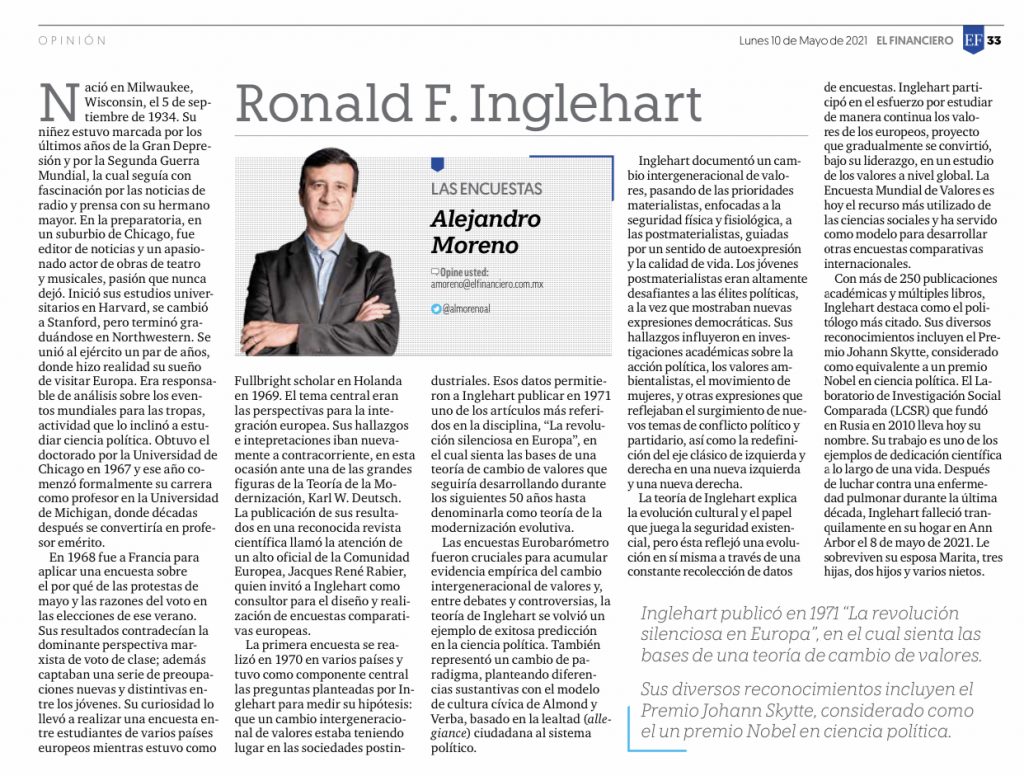Passing of Ronald F. Inglehart
 WAPOR was saddened to hear about the passing of Ronald F. Inglehart this past weekend. We ask that you join us in remembering his legacy.
WAPOR was saddened to hear about the passing of Ronald F. Inglehart this past weekend. We ask that you join us in remembering his legacy.
Ronald F. Inglehart (1934-2021)
contributed by Alejandro Moreno
He was born in Milwaukee, Wisconsin, on September 5, 1934. His childhood was marked by the last years of the Great Depression and by World War II, which he followed with great fascination in radio and press news with his older brother. In high school, in a Chicago suburb, he was a news editor and a passionate actor of plays and musicals, a passion he never left. He began his undergraduate studies at Harvard, switched to Stanford, and finally graduated from Northwestern. He joined the army for a couple of years, where he made his dream of visiting Europe come true. He was responsible for analysis of world events for the troops, an activity that led him to study political science. He obtained his doctorate from the University of Chicago in 1967 and that year he formally began his career as a professor at the University of Michigan, where decades later he would become a professor emeritus.
In 1968 he went to France to conduct a survey on the reasons for the May protests and understand voters’ choices in that summer’s elections. His results contradicted the dominant Marxist view of class voting; they also captured a series of new and distinctive concerns among young people. His curiosity led him to conduct a survey among students from various European countries while he was a Fullbright scholar in the Netherlands in 1969. The central theme was the prospects for European integration. His findings and interpretations went against the tide again, this time againts one of the great figures of Modernization Theory, Karl W. Deutsch. The publication of his results in a renowned scientific journal caught the attention of a high official of the European Community, Jacques René Rabier, who invited Inglehart as a consultant for the design and implementation of European comparative surveys.
The first survey was conducted in 1970 in several countries and had as a central component the questions posed by Inglehart to measure his hypothesis: that an intergerational change in values was taking place in post-industrial societies. These data allowed Inglehart to publish in 1971 one of the most referred articles in the discipline, “The Silent Revolution in Europe”, in which he lays the foundations of a theory of value change that he would continue to develop during the next fifty years, becoming an Evolutionary Modernization Theory. Eurobarometer surveys were crucial in accumulating empirical evidence of intergenerational value change, and amidst debate and controversy, Inglehart’s theory became an example of successful prediction in political science. It also represented a paradigm shift, posing substantial differences with the Almond and Verba model of civic culture, based on citizen allegiance to the political system.
Inglehart documented an intergenerational shift in values, moving from materialist priorities, focused on physical and physiological security, to postmaterialist values, guided by a sense of self-expression and quality of life. The young postmaterialists were highly defiant of political elites, while showing new democratic expressions. Their findings influenced academic research on issues like political action, environmental values, the women’s movement, and other expressions that reflected the emergence of new issues of political and party conflict, as well as the redefinition of the classic axis of left and right into a new left and a new right divide. Inglehart’s theory explains cultural evolution and the role that existential security plays, but it reflected an evolution in itself through constant collection of survey data. Inglehart was involved in the effort to continually study the values of Europeans, a project that gradually became, under his leadership, a study of values at a global level. The World Values Survey is today the most widely used resource in the social sciences and has served as a model for developing other international comparative surveys.
With more than 250 academic publications and multiple books, Inglehart stands out as one of the most cited political scientists. His various accolades include the Johan Skytte Prize, considered the equivalent of a Nobel Prize in political science. The Laboratory for Comparative Social Research (LCSR) that he founded in Russia in 2010 bears his name today. He was the 2014 recipient of WAPOR’s highest honor, the Helen Dinerman Award, for his significant contributions to survey research methodology, specifically in the area of cross-cultural research. His work is one of the examples of scientific dedication throughout a lifetime. After battling an illness for the past decade, Inglehart passed away peacefully at his home in Ann Arbor on May 8, 2021. He is survived by his wife Marita, three daughters, two sons, and several grandchildren.
You can also find a piece in Spanish (also by Alejandro Moreno) online at: https://www.elfinanciero.com.mx/opinion/alejandro-moreno/2021/05/10/ronald-f-inglehart/
Also shown below:



